Jane’s had three different cancer diagnoses in two years
This article contains themes of relapse and no further treatment options being available.
Jane Alder believes her sense of humour has helped her cope with a breast cancer diagnosis, followed by being told she had MDS, and then leukaemia – all within two years.
She was cured of the breast cancer, but the treatment caused an aggressive form of myelodysplastic syndromes (MDS). Then, after relapsing to the treatment protocol on an international clinical trial, the MDS turned into AML.
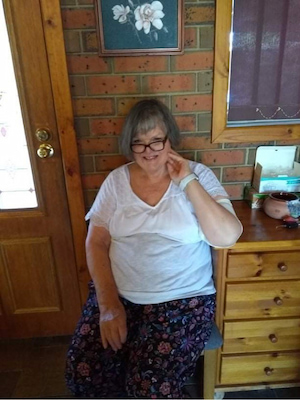
Now, Jane is fighting for her life on another clinical trial. If she fails to respond, she has made the decision not to pursue further treatment, rather… to do the things she likes to do, like painting, spending time with her family and socialising with girlfriends.
Jane’s progress from breast cancer to MDS and then to AML
Let’s go back to the beginning, when the results of a mammogram in December 2019 showed some changes to one of Jane’s nipples. She didn’t get a copy of the report which suggested a follow-up and over the next two months her treating GP prescribed Canesten cream (an antifungal), which Jane applied until she “happened to change doctors”.
This doctor read the mammogram report, “jumped into gear” and made an appointment for Jane at a hospital breast clinic.
“They did a biopsy and found an extensive infiltration of cancer cells in my right boob, so very quickly thereafter, I had a lumpectomy, and the sentinel node was positive, so they did an auxillary clearance to remove the lymph nodes in my armpit,” said Jane.
This was in April 2020 and Jane, a retired barrister’s clerk, now aged 74, went on to have radiotherapy.
“The treatment cured me of breast cancer, but it also sort of killed me really.”
“The radiotherapy caused my bone marrow to stop functioning properly. This was all within that year, 2020. It was the worst year ever,” Jane exclaimed.
Being diagnosed with secondary MDS
When the risks of having radiation therapy had been explained to her, Jane was told, “sometimes it can lead to another cancer”, and when she asked the radiologist how many people this had happened to that he had treated, his response was “none”.
“So, you see, it is very rare for that to happen, and I don’t want to scare people,” said Jane, “but it does happen.”
Her bone marrow failed not long after finishing radiotherapy.
“I had a blood test, because I had one every 12 months as a regular thing. Just after that, the doctor said, ‘your platelets and your red blood cells are down a bit, we’ll follow up in three months’.
“I didn’t really think anything of it,” said Jane, putting it down to it “being an understandable reaction to having had two surgeries, the anaesthetics, the radiotherapy, and all that sort of stuff”.
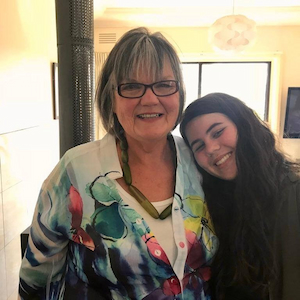
She went back to the doctor in November 2020 and after having a blood test, she got “a big panicky phone call”.
“I had to go and have another blood test. I spent a week in hospital, and they did whole heap of tests, to tell me what had happened,” said Jane.
She had developed myelodysplasia.
“I had never heard of myelodysplasia, and it didn’t even sound bad,” said Jane, but when she asked her haematologist about the prognosis, he said, ‘not too good really’.
“It was nine months to two years, and when they realised the type of MDS; a very high-risk one with complex cytogenetics, it was more like eight or nine months,” said Jane.
“I thought, ‘oh s**t, excuse the language, oh dear’. Then he sent me a booklet and I read it and thought, ‘oh, s**t’.
“It was quite a shock at first, but I didn’t drop my bundle or anything. It felt unreal to be quite honest, for quite a while.
“And then I got caught up in the treatment part of it. You’re forever rushing off and back to the hospital, and that sort of took over.
“That was a one-step-at-a-time thing, if you know what I mean. That was the job I was doing then,” explained Jane.
Being on a clinical trial for myelodysplastic syndromes
When Jane was diagnosed with MDS, she was told, “because it was a secondary cancer and because of some of the mutations, it might be quite hard to treat”.
“I was very lucky that they moved really quickly to get me into a trial at Peter Mac [the Peter MacCallum Cancer Centre].”
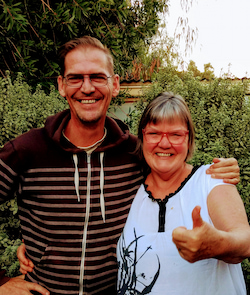
Jane lives in the outer Melbourne suburb of Sunbury, 37km from the CBD and a 40-minute trip to Peter Mac “if we go down the freeway, but I have to pay tolls, so it’s actually quite an expensive exercise”.
She was given a lot of information about the Phase III international study and, based on the trial’s results, Jane said it wasn’t a hard decision to go on the trial.
“There were quite positive results from overseas, not as a cure but an extension of overall survival.
“It was a fairly new trial in Australia and I was one of the four people who started the trial in early January at Peter Mac,” said Jane.
She explained that they would stay on the trial for as long as the treatment protocol was effective.
“But once it stopped working, then that’s it. I was the only one of four left standing,” said Jane.
“It was a double-blind trial. Everybody got azacitidine (Vidaza®), which is the standard of care, and some people got the trial drug, magrolimab.
“The magrolimab was an infusion and the azacitidine was two injections into the stomach for seven days in a row,” said Jane.
“It was wearying because I had to go down there [to Peter Mac] to have that, because of the trial protocol.
“The stomach gets very, very inflamed and very sore,” said Jane.
She wasn’t able to take anti-nausea medication because of other side effects, “so, I used to come home and chuck, so it was good fun!
“I had a very violent reaction to the magrolimab, really life-threatening, during the first two cycles, in January and February,” she said.
“I was taken by ambulance to the hospital three times. It was quite dramatic really. On one trip in, I had six units of blood.
“That was in response to the magrolimab. It was pretty obvious that I was getting the trial drug,” said Jane.
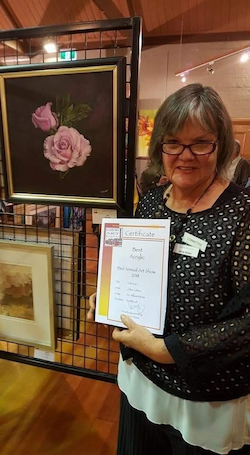
“I met a really nice lady who was on the same trial as me. We started on the same day and we both had the same reactions to start with.
“We used to have a few laughs, and it was good because we could make jokes between us because we both had the same disease. But she died. She did have a lot more problems health-wise I think. She’d had ovarian cancer that she was cured of many years before,” said Jane.
“I have got a sense of sense of humour. That helps because I don’t know how you’d cope if you didn’t.”
“Keeping your sense of humour is really important, for your own mental health, for me anyway.”
There was one aspect of the trial that Jane didn’t like; it was double blind.
“I didn’t know how I’d cope with that whole idea of not knowing what’s going on. But in a way, having those really severe reactions made that easier for me, just because I knew I was getting it [magrolimab, rather than the placebo].
After the second cycle Jane was given prednisolone prior to receiving the trial drug which she said, “switched off the reaction”.
“They stopped doing that after some time and it was fine, it didn’t have any side-effects.
“I went from February to October without having any blood transfusions at all, which was really good. It was one less running around thing I had to do, because that’s basically all you do really, chase the treatment. It takes over your whole life.
“I was wiped out, really exhausted most of the time and feeling quite nauseous and lacking energy, plus we were in serious lockdown here with COVID,” she said.
“As time went on, it was taking longer and longer for my blood to recover, my platelets in particular. And my neutrophils were either sitting on zero or 0.1, which they’ve done for a long time now, so I was very open to infections. I’m very lucky that hasn’t happened to me.
“From about May or June, they kept delaying treatment for a couple of weeks at a time, pushing out the cycle, making it longer, to try and let my blood recover.
“And at times, because my neutrophils would be zero, I had to give myself those growth injections at home, to bring up these levels.
“Finally, it got to the stage where nothing was really recovering, so they did a bone marrow biopsy.
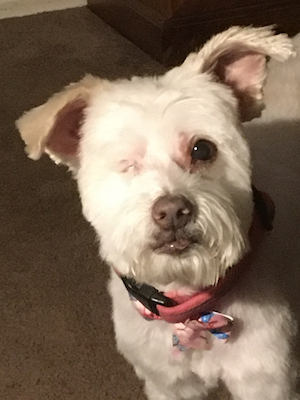
“That was in October. They said the treatment had stopped working.
“I wasn’t surprised. I pretty much knew what was going to happen,” said Jane.
“The trial protocol dictates that you have another full cycle, then they repeat the bone marrow biopsy just to make sure it wasn’t a glitch.
“So that’s what happened, and in that period my blasts had gone up to 12%.
“Then they said there was another promising trial for MDS, and I had to have another bone marrow as part of the screening process, about 10 days later, in November.
“That showed that in those 10 days, I’d transformed from the myelodysplasia to acute myeloid leukemia.”
“So that trial was off. I would have been the first person in Australia to go on it. It was a Phase I trial which was a bit alarming really. I can’t remember the name of it. I ditched the paperwork as soon as that was out.”
Jane had been told her AML was quite aggressive.
“Because it’s secondary to MDS and secondary to radiotherapy – the whole kit and caboodle – it’s really hard to treat. They’ve been quite open with me about the fact that they’re not expecting to beat the disease at all,” said Jane.
“I actually knew that, pretty much from the start [when first diagnosed with MDS], because my first haematologist was very open, and I like that. I like to have a lot of information. I’m a realist and I need to do things and have things in order for everybody.”
Starting a trial for acute myeloid leukaemia
A week later Jane was told about a trial for AML, and she began screening for the study, called Intervene, also known as AMLM25.
“I went into hospital the week before Christmas to start this new trial, so it was only a matter of two weeks from when the other trial stopped working and I started the next one.”
Jane is on the trial arm that receives the standard of care, venetoclax (Venclexta®), and cytarabine (LDAC) plus one of the study drugs, pracinostat.
She started the treatment in hospital to monitor her for tumour lysis syndrome (TLS).
“If the treatment works, it kills all the cancer cells and you can get really sick,” said Jane.
“The doctor said that it is one of those things which they really like to see a little bit of, but I didn’t have any [TLS].
“The other thing is that I’m having platelet transfusions quite a lot. My platelets seem to be only holding up for about three to four days, which is a little bit alarming,” she said.
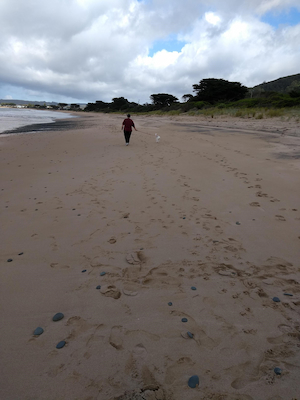
On January 14, at the end of the first cycle, Jane had another bone marrow biopsy* to find out if the treatment was having any effect.
“So this treatment may have an effect or it may not and there will be some indication in this bone marrow biopsy,” she explained.
“If it’s not having any effect, I think they’ll try one more cycle. And then if it’s not having an effect at the end of the second cycle, then they will not continue with it, which is reasonable. Then it’ll be palliative from then on.
“So that’s where I am at the moment,” said Jane openly.
“I would really like just to do my own thing for the remainder of my life really, but I’m certainly prepared to give this trial its two cycles and then that will be enough for me I think, because the last two years has been pretty horrendous with the lockdown and the treatments.
“And when we know they’re not going to beat it anyway, there’s got to come a time where you say ‘enough is enough’ really, for everybody. That’s the way I feel about it anyway.
“I’m just trying to do as much stuff that I like as I can.”
Jane’s family support network
Jane has three middle-aged sons, Michael, Timothy, and Simon, and one grandchild, Violet, 19.
“To have three sons and one grandchild is disgusting, but my grandchild is perfect, so why would you want to try for more?” said Jane wryly.
“She’s absolutely gorgeous and, horrifically, her mother is undergoing treatment for triple-negative breast cancer at Peter Mac. So, her mum and her grandmother are both at Peter Mac, and if we’re in there at the same time, we all catch up.”
Jane said she was fortunate that prior to COVID her eldest son, Michael, had chosen not to renew the lease on his Melbourne café.
“He came to stay for a while, to have a break, before getting on with the rest of his life. He was here when I was diagnosed with breast cancer,” said Jane.
“That was such a rollercoaster, and it was quite quick from then to when I was diagnosed with MDS and AML, so he stayed on, and he’s going to be here for the duration. He’s my official carer now.
“He’s been absolutely fantastic. He runs me around and he cooks. Having had a café, he’s an amazing cook. If I think, ‘oh, I feel sick, I’m not going to eat,’ it becomes ‘I didn’t really feel hungry, but now I’ll eat’.
“My sister is here now, so that’s been lovely” said Jane, referring to her older sister, Athalie who was visiting.
“We’re Irish twins, we’re 364 days apart in age.
“She’s been a great support to me through this whole thing. It’s been really good. She’s come down from New South Wales a few times.
“You get obsessed with blood counts and I share all my blood counts with her and that sort of thing.
“We recently went down to St Kilda and had lunch with my youngest son, Simon.
“He’s the one who meets me at beaches and makes adventures for me. I’d never been to the opera, so we went to the opera,” said Jane.
“He’s a doctor of archaeology and runs a company that makes virtual reality reconstructions of old ruins. Just before the breast cancer, he bought me a return ticket to France where he was living. We went to Rome, and he took me on one of his VR tours. It was amazing.
“Timothy is renovating at the moment. He’s only just got his first jab – the vaccination – so I can’t see him at the moment.
“He was a bit reluctant to get it, but he’s getting it because he’s going to see me.”
Then there’s Jane’s 12-year-old Maltese, Maggie, who had just gone blind.
“At the end of 2020, she lost an eye, and when I came home from hospital on Saturday [1 January 2022], she was blind in the other eye,” said Jane sadly.
“Athalie and I spent some hours at the vet getting her treated and now we’re trying to train her on how to be a comfortable blind dog.
“She’s very pretty and she bosses my son’s chocolate Labrador around. Now, if she hears his breathing coming towards her, she goes off her little face at him.”
But a few days later, Jane had to go back to hospital with a bacterial infection.
“I realised that in all fairness to her, she needed someone who could reliably be there for her. I contacted Rescued With Love and surrendered her to them, and I cry every time I get updates,” said Jane.
“The hardest choice I have made is to rehome her.”
On top of that, Jane’s 100-year-old mother died on January 18. She had previously lived with Jane at Sunbury before moving to a nursing home.
Summing up the progression of her disease
“It’s been really quick actually,” said Jane.
“Some people I’ve seen have been battling the MDS for a long time, for years. A lot longer than I have.
“The progression from the breast cancer in April 2020 to now [January 2022] has been really quite quick for me.
“I hate saying journey. I think a journey is where you drive from one town to another,” she commented.
“Everything has been about the treatment, which is all-consuming.
“You do the best you can in the hope that something’s going to work. And in the end, you’ve got to decide whether quality of life is important to you, and I’ve got to the stage where quality of life is probably more important to me now,” she said.
“And I have a lot more energy when I’m not having treatment.
“I paint and I haven’t been able to paint much at all for the last couple of years because I couldn’t get a run at it because I was interrupted all the time. I’d like to be able to do some of that because that is something I really can get my head into, to the exclusion of everything else.”
Jane’s advice to others
Based on her experience over the last two years, Jane says her key advice is to ask lots of questions and “find out everything you can about treatment and side effects”.
“Once my questions were answered, I would leave it to the doctors because they went to [medical] school for a long time,” said Jane.
“And once I’ve got my head around what’s actually happening, I just do what they tell me to, without any dispute.
“Also, try any trial that shows promise because you never know, and not only that, you’re helping the research if you do that.
“My best advice as far as coping, is look outwards, not inwards.
“And when it comes to your haematologist and other specialists, “try and get somebody who talks straight talk to you and not someone who brushes you aside and says, ‘I will think of something’.
*Postscript: “My bone marrow biopsy showed that the treatment is not working,” said Jane. “I am now home and hope to stay here. The second and last cycle will start probably about 31 January.”
In late-March, Jane sounded high-spirited. “I’m battling on. I’m now at home with palliative care supporting me and the transfusions are keeping me comfortable”. When Jane spoke to AML News, she was visiting Sunshine Hospital for a blood transfusion. “After the second unit of blood, I feel a lot better,” she said.
If you have found any content in this story difficult or challenging, we encourage you to take care of your mental health and wellbeing, and to seek the advice of your treatment team if you have any questions regarding your diagnosis, treatment or side effects. If you would like more information, emotional and practical support, feel free to call 1800 620 420 to be connected to your local Leukaemia Foundation blood cancer support coordinator. Any mention of medical treatments is not an endorsement.
Last updated on July 20th, 2022
Developed by the Leukaemia Foundation in consultation with people living with a blood cancer, Leukaemia Foundation support staff, haematology nursing staff and/or Australian clinical haematologists. This content is provided for information purposes only and we urge you to always seek advice from a registered health care professional for diagnosis, treatment and answers to your medical questions, including the suitability of a particular therapy, service, product or treatment in your circumstances. The Leukaemia Foundation shall not bear any liability for any person relying on the materials contained on this website.